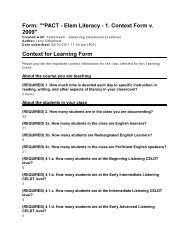The Tutoring Book - California State University, Sacramento
The Tutoring Book - California State University, Sacramento
The Tutoring Book - California State University, Sacramento
Create successful ePaper yourself
Turn your PDF publications into a flip-book with our unique Google optimized e-Paper software.
Labels and Misleading Assumptions: “ESL Students”<br />
87<br />
Sarah Faye<br />
Spring 2011<br />
Labels are easy. We throw them around without thinking, thus putting people into strict<br />
categories for easy filing. However, being a tutor means being flexible when encountering unexpected<br />
tutoring situations, and respecting the students as individuals. <strong>The</strong>refore, we must be careful when we use<br />
easy, one-size-fits-all, labels such as: “ESL students.”<br />
Sharon A. Myers’ article on tutoring ESL students points out some techniques on how to help<br />
students who are struggling with the English language, and these techniques can undoubtedly be very<br />
useful for tutoring multilingual students. Myers says that ESL students need to focus on “the ‘linguistic<br />
component’ (vocabulary and syntax) much or more than [on] the ‘writing’ (rhetorical) component,” and<br />
that we should pay attention to LOCs when tutoring ESL students (Myers 220). As an example, she states<br />
that “subject-verb agreement is a difficult feature of English” (Myers 230). I agree: the English<br />
language’s grammar rules are mind bogglingly difficult – but this is so for ESL and native speakers alike.<br />
So why only help ESL students with LOCs? Just because we have labeled them as “ESL students?”<br />
Behind the label “ESL,” there are two lurking assumptions: 1) all ESL students don’t know<br />
English very well; 2) all native speakers know English very well. <strong>The</strong>se assumptions do not reflect the<br />
reality, since I am a so-called ESL student and I tutor a native speaker who does not know the rule of<br />
subject-verb agreement. Should we call my native speaker an “ESL student?” After all, why should we<br />
separate ESL students from native speakers who have the same difficulties with the English language?<br />
<strong>The</strong> focus here should not be the place of birth, but the level of proficiency with written English. When I<br />
tutor my native-speaker student, I apply Myers’ method of focusing on LOCs, showing him “the many<br />
complex ways a language determines, subordinates, coordinates, lexicalizes and so on” (Myers 224). I do<br />
this because I recognize that this native-speaker student has similar language issues as what Myers calls<br />
ESL students.<br />
<strong>The</strong> term “ESL” is misleading. Although we break this term down in class into different<br />
categories (international students, immigrant students, Generation 1.5, and eye vs. ear learners), Myers’<br />
article throws around the label indiscriminately, as if ESL students all came from the same background<br />
and had the same level of proficiency with the language. Rather than just labeling students as “ESL,”<br />
tutors should always take into consideration more important things than the place of birth, such as the<br />
level of confidence with the language, the understanding of the American rhetorical and academic<br />
conventions, and the individual preferred learning style.<br />
I want to come back to one of the assumptions behind separating ESL from native speakers,<br />
which is: assuming that native speakers should know written language better than ESL students. This<br />
assumption can affect the way we see native speakers who have the kind of problems that Myers links to<br />
ESL students. We might wonder why, since they were born here and speak English at home, they do not<br />
understand a specific grammar rule. We might get frustrated that they are not able to pick up their<br />
mistakes when they read their paper a second time. But native speakers, like ESL students, come from<br />
very different backgrounds; some of these backgrounds did not offer them real opportunities to have<br />
someone teaching them the rules of grammar and spelling, or mentoring them in the differences between<br />
spoken and written conventions. However, tutors often believe they should not point out LOCs to native<br />
speakers, since they think these students should be able to see their mistakes when they reread their drafts.<br />
If the students fail to meet these unrealistic expectations, tutors might see them as lazy or distracted. Even<br />
worse, I have witnessed native speakers being completely demoralized by the comments that their<br />
professors left on their writing. <strong>The</strong> tone in some of these comments stops just short of calling them<br />
stupid because they keep making the same grammar or spelling mistakes. <strong>The</strong>se comments reveal the<br />
professors’ impatience towards students they feel should know “better than that,” and these professors’<br />
assumptions about their students create an environment of frustration that goes against effective learning.

















